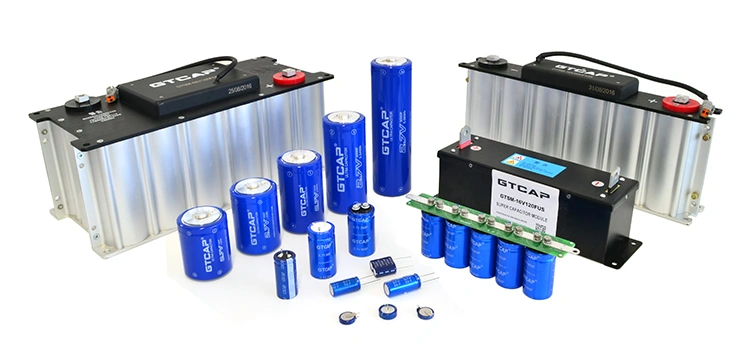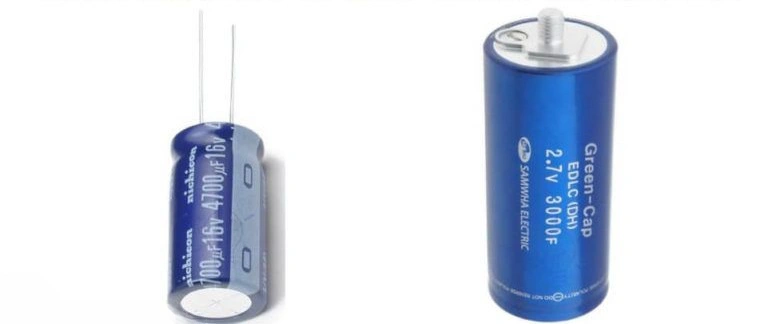Understanding the difference between capacitor and ultracapacitor is essential for choosing the right energy storage solution. While both store electrical energy, they differ in their capacity, discharge rate, and applications. A traditional capacitor offers quick bursts of energy but stores less power, making it ideal for short-term uses like smoothing voltage.
On the other hand, an ultracapacitor stores much more energy and delivers it over longer periods, making it perfect for high-power, long-duration applications. Whether you need rapid power or long-lasting energy storage, knowing the difference between capacitor and ultracapacitor will help you make an informed decision. Ready to explore the best solution for your needs? Let’s dive in!
What is a Capacitor?

A capacitor is an electrical component that stores and releases energy, helping to manage electrical charge in circuits. It’s commonly used for filtering, voltage smoothing, and storing energy for short bursts, such as powering motors or stabilizing power supplies.
Key characteristics include its energy storage capacity, which determines how much power it can hold, its discharge rate for releasing energy quickly, and its lifespan, which varies based on usage and conditions.
What is an Ultracapacitor?

An ultracapacitor is a high-performance energy storage device that stores and releases energy much faster than traditional capacitors. It differs in design by using a double-layer structure that enables greater energy density, allowing for more energy storage in a smaller space.
Common applications include energy backup, regenerative braking in electric vehicles, and power smoothing. Ultracapacitors are known for their high energy density, rapid discharge rate, and long cycle life, making them ideal for high-power, long-lasting applications.
Key Difference Between Capacitor and Ultracapacitor

Energy Density: Ultracapacitors store significantly more energy than traditional capacitors due to their unique design, which uses a double-layer structure. This allows ultracapacitors to store energy over longer periods, making them ideal for high-energy, long-lasting applications. Capacitors, on the other hand, store less energy, focusing on short bursts of power rather than sustained storage.
Discharge Rate: Ultracapacitors discharge energy much faster than regular capacitors. Their rapid discharge rate allows them to deliver large amounts of power in a short time, ideal for applications like regenerative braking or energy backup. Capacitors, while capable of quick discharge, are generally slower and more suited for steady, consistent energy release in low-power applications.
Lifespan and Cycle Time: Ultracapacitors have an exceptionally long lifespan and can handle millions of charge and discharge cycles without significant degradation. This makes them durable for high-cycle applications like electric vehicles and industrial equipment. Capacitors, in contrast, typically have a shorter cycle life and may degrade faster under frequent use, making them better suited for lower-cycle applications.
Applications: Ultracapacitors excel in applications that require rapid energy delivery and high efficiency, such as regenerative braking systems in electric vehicles, grid energy storage, and backup power for renewable energy systems. Capacitors are commonly used in consumer electronics, power supplies, and small motors, providing essential voltage smoothing, filtering, and short-term energy storage.
Difference Between Capacitor and Ultracapacitor: Pros vs Cons
Difference Between Capacitor and Ultracapacitor: Pros Comparison
Capacitor Pros: Capacitors offer quick response times, making them perfect for applications where energy needs to be stored and released rapidly. They are cost-effective and compact in design, making them ideal for smaller, more space-conscious systems like consumer electronics and power supplies. Their simplicity and low cost make them a go-to choice for basic energy storage tasks.
Ultracapacitor Pros: Ultracapacitors shine with their superior energy storage capacity, capable of storing much more energy than traditional capacitors. Their long lifespan makes them suitable for high-cycle applications, such as in electric vehicles or grid energy storage. Ultracapacitors can handle quick charge and discharge cycles, providing power in short bursts where traditional capacitors may not suffice.
Difference Between Capacitor and Ultracapacitor: Cons Comparison
Capacitor Cons: Capacitors have limited energy storage and a shorter discharge time compared to ultracapacitors. Their cycle life is also shorter, making them less durable in applications requiring frequent energy bursts or long-term use. They are better suited for applications where short-term energy storage is enough, such as in power smoothing or filtering.
Ultracapacitor Cons: Ultracapacitors come with a higher initial cost and are generally larger in size compared to traditional capacitors. While they have high energy storage, their energy density is lower than that of batteries, which means they cannot store as much energy for long durations. Despite their impressive power delivery, ultracapacitors are often not the best choice for applications requiring continuous power over extended periods.
Difference Between Capacitor and Ultracapacitor: Use Scenarios
Ideal scenarios for using a capacitor: Capacitors are most effective in applications where quick energy storage and short discharge times are required. They are ideal for filtering signals, stabilizing voltage, and smoothing power supplies in sensitive electronics.
Capacitors are commonly found in power stabilization circuits, audio systems for noise reduction, and in certain consumer electronics where space is limited and rapid response times are essential. Their compact design and low cost make them a go-to solution for low-power applications where only moderate energy storage is needed.
Best uses for an ultracapacitor: Ultracapacitors thrive in high-power applications where rapid bursts of energy and high efficiency are critical. They are the preferred choice for regenerative braking systems, energy backup in critical infrastructure, and in electric vehicles where quick acceleration demands high-energy release.
Ultracapacitors are also ideal for grid energy storage, supporting renewable energy sources like solar and wind by providing fast energy bursts during periods of high demand. Their long cycle life and ability to handle frequent charge/discharge cycles make them excellent for applications requiring sustained performance over time, ensuring reliable energy storage and delivery without significant degradation.
These distinct use scenarios highlight the important differences between capacitors and ultracapacitors. Capacitors are best for low-power, high-speed applications, while ultracapacitors are the go-to solution for high-energy, high-power systems that require frequent, rapid bursts of energy.
Emerging Trends and Future of Ultracapacitors

Advances in ultracapacitor technology are improving energy density, charging speed, and lifespan, making them more efficient and versatile. Ultracapacitors are increasingly being integrated into modern energy systems like electric vehicles, where they provide fast power bursts for acceleration, and in grid storage to balance energy supply and demand.
As these devices continue to evolve, they have the potential to disrupt the energy storage market by offering cost-effective, sustainable solutions for high-power applications.
Conclusion
In conclusion, understanding the difference between capacitor and ultracapacitor is crucial for selecting the right energy storage solution for your needs. Capacitors excel in low-power applications requiring fast responses, while ultracapacitors shine in high-energy, high-cycle systems like electric vehicles and renewable energy storage.
Both have their advantages and limitations, so choosing the right option depends on the specific demands of your project. To explore the full potential of these devices, consider the difference between capacitor and ultracapacitor to make an informed decision today!
FAQ
What is the difference between the two types of capacitors?
The main difference between capacitors and ultracapacitors lies in their energy storage capacity and discharge rates. Ultracapacitors can store much more energy than regular capacitors and discharge it faster. While regular capacitors are typically used for low-energy tasks like filtering and voltage smoothing, ultracapacitors are ideal for high-power applications that require quick bursts of energy, such as in electric vehicles or renewable energy systems.
What is the use of an ultracapacitor?
Ultracapacitors are used in applications that require rapid energy delivery and high efficiency. They are commonly found in regenerative braking systems, electric vehicles, uninterruptible power supplies (UPS), and grid energy storage. Their ability to handle frequent charge and discharge cycles makes them ideal for applications that need quick power bursts and long cycle life, especially in renewable energy and transportation industries.
Which type of capacitor is best?
The best type of capacitor depends on the specific needs of your application. For energy storage and fast discharge in high-power applications, an ultracapacitor is the ideal choice. For low-power tasks like signal filtering, voltage smoothing, or energy storage for short bursts, a traditional capacitor is better suited. Assess your power requirements, discharge rate, and lifespan needs to determine which type fits best.
Are supercapacitors AC or DC?
Supercapacitors are primarily used in DC (direct current) circuits. While they can be incorporated into AC systems through rectifiers or other components to convert AC to DC, they operate by storing and discharging energy in a DC environment. Supercapacitors are especially valuable for applications where fast charge/discharge cycles and high-energy storage are needed, such as in DC-powered systems.
Can a supercapacitor replace a battery?
A supercapacitor cannot completely replace a battery, but it can complement one in specific applications. While supercapacitors provide rapid energy delivery and have an extremely long cycle life, they have lower energy density than batteries, meaning they can’t store energy for as long. Batteries are better for long-term, sustained energy storage, while supercapacitors excel in applications that require quick bursts of power or frequent cycling.
What is the strongest capacitor?
The strongest capacitors in terms of energy storage are typically ultracapacitors (also known as supercapacitors). These capacitors can store much more energy than regular capacitors and discharge it faster, making them suitable for high-power applications. However, the “strength” of a capacitor also depends on the specific needs of the application, such as voltage rating, energy density, and discharge rate. For specialized high-energy storage, ultracapacitors lead the field.